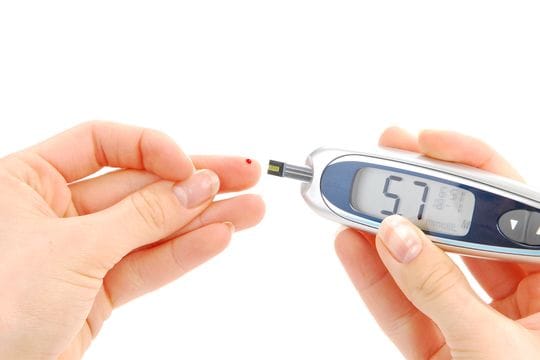Follow your doctor’s advice and the instructions that come with the glucose meter. In general, you will follow the steps below. Different meters work differently, so be sure to check with your doctor for advice specifically for you.
- Wash your hands and dry them well before doing the test.
- Use an alcohol pad to clean the area that you’re going to prick. For most glucose meters, you will prick your fingertip. However, with some meters, you can also use your forearm, thigh, or the fleshy part of your hand. Ask your doctor what area you should use with your meter.
- Prick yourself with a sterile lancet to get a drop of blood. (If you prick your fingertip, it may be easier and less painful to prick it on one side, not on the pad.)
- Place the drop of blood on the test strip.
- Follow the instructions for inserting the test strip into your glucose meter.
- The meter will give you a number for your blood sugar level.
Tips on blood sugar testing
- Pay attention to expiration dates for test strips.
- Use a big enough drop of blood.
- Be sure your meter is set correctly.
- Keep your meter clean.
- Check the batteries of your meter.
- Follow the instructions for the test carefully.
- Write down the results and show them to your doctor.
How often should I check my blood sugar level?
Check your blood sugar as often as your doctor suggests. You’ll probably need to do it more often at first. You’ll also check it more often when you feel sick or stressed, when you’re changing your medicine or if you’re pregnant. People taking insulin may need to check their levels more often.
Keep track of your blood sugar levels by writing them down. You can also keep track of what you’ve eaten and how active you’ve been during the day. This will help you see how food and exercise affect your blood sugar level.
What should my blood sugar level be?
Talk with your doctor about what is a healthy blood sugar level range for you. A level of 80 to 120 before meals is often a good goal, but not everyone who has diabetes can get their blood sugar level this low.
Be sure to talk with your doctor about what to do if your blood sugar level isn’t within the range that’s best for you.
How does food affect my blood sugar level?
Anytime you eat, you put sugar in your blood. Eating the right way can help control your blood sugar level.
You need to learn how what you eat affects your blood sugar level, how you feel, and your overall health. As a general rule, just following a healthy diet is wise. Your doctor may suggest you meet with a dietitian who can teach you how to make healthier food choices. See the box below for some tips on eating right.

